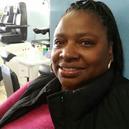
Ever since her teenage years, Sederia Lewis heard voices. Despite common perceptions about voices, hers encouraged her to reach for her goals, and to overcome obstacles in her life. Despite her own positive experiences with the voices, telling others about them led to numerous trips to therapists and psychiatrists, as well as medications to lessen their presence in her life. Though some of this work was helpful to her, she mostly learned to not tell people about what she was hearing. At the same time, she didn’t gain the tools to make sense of her life, or to move forward. Eventually she began to find her way by connecting with peer groups, and then the hearing voices network. In her first hearing voices group facilitator training, she discovered that she was not alone in hearing voices, and that hearing voices could be seen as a source of strength.
In 2014, to further explore her experiences with voices, Sederia helped to start the first hearing voices group in Berkeley. As her participation in this group, and others continued, Sederia found she was able to make healthier choices in all areas of her life. As she built new habits of living, developed greater inner strength, as well as a community of mutual support, she found the voices stopped. In one sense, they have been replaced with voices from the group she facilitates, which has flourished now with an average of 15 participants per group. Much of the behind the scenes work for this group, and others like it requires significant support. The Bay Area Hearing Voices Network, is a local 501(c)(3) non-profit dedicated to developing awareness around voices, visions, unusual beliefs and extreme states, and depends on volunteers to function. Our groups are part of the international hearing voices network, which seeks build community and change perceptions of the experience of hearing voices. But to sustain and build communities like the one that Sederia leads, we are asking for your financial assistance. As little as $1 will keep our website up for a week, $40 for a year, and $150 could pay for a speaker at a local organization. If we can reach our goal of $25,000, we can improve our website, and apply for grants to expand the services we provide. With your help, we will expand opportunities for people to understand these experiences, so that like Sederia, when a supportive voice leaves us, we will always have a place to go where we can find another. NBC News - Hearing voices others can't: How a growing movement fights mental health stigma12/12/2018
What is it like hearing voices that others can't? For Jeannie Bass, hearing voices is her daily reality. The medical term is "auditory hallucinations." Jeannie is a leader in the Hearing Voices Movement, which aims to re-frame and destigmatize the extreme mental experiences that society labels as "crazy."
To see video see link Can the breakdown of psychosis show the way forward to spiritual breakthrough? Is there a path through the depths of mental health crisis independent of hospitals, doctors, and therapists? Adrian Bernard was labeled a chronic schizophrenic and spent 20 years living on a disability check. After surviving a spiritual ordeal tested by God he is today manager at the Second Story hospital alternative in Santa Cruz California, where listening, community, art and music help people like Adrian make their way back from madness.
To listen to check the link Written by Tori Rodriguez, MA, LPC
Historically, there have been low expectations for recovery in schizophrenia, which is associated with high rates of morbidity, mortality, and disability, as well as estimated annual economic costs of $155.7 billion and a 10% to 15% employment rate.1 In recent years, the focus of mental health policy and treatment for individuals with schizophrenia in the United States has shifted from stabilization of those with chronic disease to intervention in the early stages of the illness. For more see the link Written by Emily Knoll
Emily Knoll discusses the therapeutic interventions that have helped her come to terms with hearing voices For more see the link Written by Patricia E. Deegan Ph.D.
The word “recovery” has now stuck onto every sentence uttered in mental health services just so we’ll know just how “recovery oriented” everything and everyone has now become. “Recovery oriented” is now an established branding but just what does that mean? And what do they mean by “recovery”? In this article Pat Deegan shares at some length, her journey of how she started to struggle, how things started to take a strange turn for her, then how others – adults – took charge and decided that she was ill and that they needed to take control of and set limits on her life. For more see the link Written by Katie Hampson
People who do not have mental health problems can hear voices too. So what is it like living with the voices in one’s mind? For more see the link |
Categories
All
Archives
May 2024
|
 RSS Feed
RSS Feed